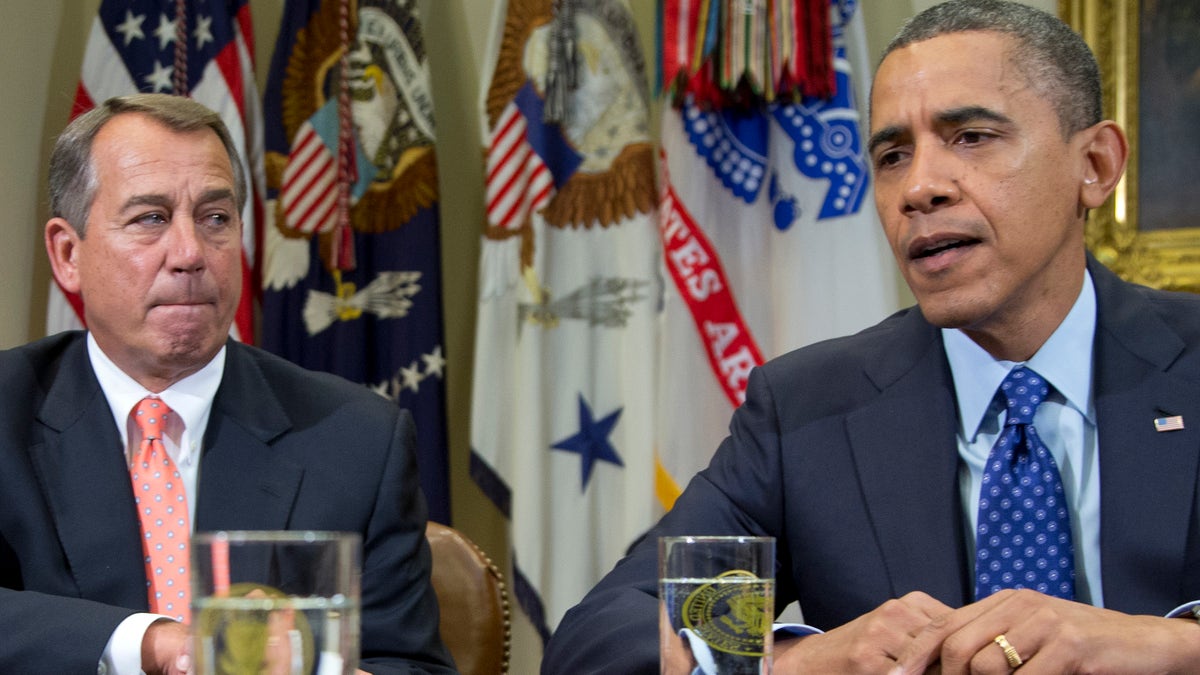
In this Nov. 16, 2012 file photo, President Barack Obama, accompanied by House Speaker John Boehner of Ohio, speaks to reporters in the Roosevelt Room of the White House in Washington, as he hosted a meeting of the bipartisan, bicameral leadership of Congress to discuss the deficit and economy in Washington. (A2012)
The term “fiscal cliff” has been used often in the past several weeks to describe the predicted hit that the economy will take if a budget deal isn’t reached by January 2, 2013, which is when tax cuts expire and deep spending cuts go into effect. Economists agree that going off the fiscal cliff will more than likely result in a double dip recession, a hike in unemployment, and the halting of any economic progress made in the last couple of years. But what does this all mean to the average American? What does it mean to working-class Latino families who are simply trying to make ends meet?
Recently, Fernando, a staff member from CASA de Maryland, an NCLR Affiliate organization, had a unique opportunity to discuss the issue at a small luncheon with Vice President Joe Biden. He told the Vice President his concern over how the fiscal cliff will affect his middle-class family. Fernando’s wife was recently laid off and the family is struggling on his income alone to support their sons, one of whom is in college and one of whom is about to graduate from high school.
Fernando did his own calculations and estimated that his taxes would go up by $210 per month, or nearly $3,000 per year. Not only would this tax hike put an additional strain on the family’s already tight finances, it would also put the brakes on Fernando’s eldest son’s dreams. This young man, who is set to graduate this spring with a bachelor’s degree in biology, is postponing his goal of pursuing an advanced degree because he is unsure of his economic prospects if the economy takes a nosedive.
For a family already in a precarious financial position, the fiscal cliff is truly worrisome.
Our economic recovery is fragile. Raising taxes on working and middle-class families is the wrong approach. Fernando and his son aren’t alone —there are millions of Americans who will take a major financial hit or put their dreams on hold if the senators and representatives we elected this past November fail to reach a deal. On average, Americans will have to pay $2,000 more in taxes.
Two weeks ago, NCLR hosted a national call with leaders from our Affiliate Network. More than 700 individuals signed up to participate. Following the call, they texted their stories and shared what falling off the fiscal cliff would mean to them. You can read more of their stories here.
Hispanic voters sent President Obama back to the White House with a clear message: build a stronger economy where hard work is rewarded, families have a chance to join the middle class, and the sick and hungry are cared for. The fiscal cliff presents an opportunity for the President and Congress to show their commitment to the voters who elected them. They should work to raise revenue from those who can afford it and protect safety net benefits for our nation’s most vulnerable.
